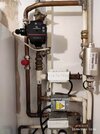I have a similar question about the bypass valve location.
My system comprises a new Vaillant heat-only boiler, pressure vessel, DHW cylinder, 3 Motorised Valves (1 x cylinder, 2 x CH zones) and 15 rads with 12 TRVs. Vaillant specify an Auto Bypass Valve (ABV) is fitted no less than 1.5m from the boiler.
The original system already had a bypass pipe which Tee's off from the Flow after the 3 MVs, at a distance of 1.3m of pipe length away from the boiler (see the attached picture). This pipe had a fixed valve (seen in the picture just behind the pump) set to slightly open, to which an ABV has recently been added, located 1.6m of pipe length away from the boiler. The bypass pipe Tee's into the Return 1.0m of pipe length from the boiler, so the total length of the current bypass circuit, taken from the boiler connections, is 3.1m.
The bypass does not work correctly in that it always allows hot water through (with all the TRVs set to fully open). Setting the ABV to max (=0.6) does not help.
My questions:
1) Does Vaillant's minimum 1.5m specification relate to where the bypass pipework Tee's off from the Flow (1.3m) or where the ABV is located (1.6m)?
2) Is the bypass malfunction due to a distance issue (1.3m, 1.6m or 3.1m) and/or the fact that the pipework Tee's off after the MVs rather than between the pump and the MVs? (This design has been there 30 years, so perhaps the bypass never worked well and I just did not realise it).
3) Would it be helpful to make the bypass pipework longer by installing a back & forth zig-zag configuration of bypass pipes on an adjacent wall and placing the ABV within that zig-zag, perhaps 2.5m from the boiler?
Thank you


